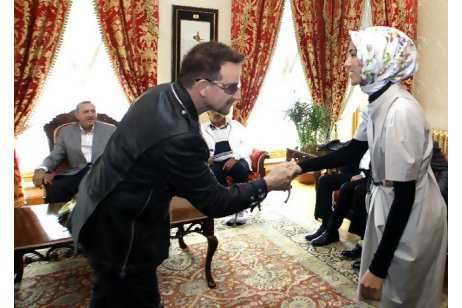Thomas Seibert
Last Updated: Dec 18, 2010
ISTANBUL // When Sumeyye Erdogan, the youngest daughter of the Turkish prime minister Recep Tayyip Erdogan, took a seat on the visitors’ balcony of a meeting room inside Ankara’s parliament building to listen to a speech by her father a few weeks ago, no one assumed the appearance was a coincidence or pure family business.

Recent sightings of Ms Erdogan, 29, at several of her father’s political meetings have triggered speculation in the media that she may be preparing to enter politics and run for a parliamentary seat at elections scheduled for June next year.
Although Ms Erdogan says her father does not want her to enter politics, the rumours swirling around her political ambition have a wider significance: in order for her to enter parliament, Turkey would have to lift the ban on the Islamic headscarf for parliamentary deputies.
Ms Erdogan wears the headscarf, as does her mother, her sister and millions of other Turkish women. Mr Erdogan, a devout Muslim who is accused by his opponents of following a hidden agenda to turn Turkey into a Islamic state, has refused to rule out changing the rules on the garment in parliament.
A long-time headscarf ban in Turkish universities, lifted only a few months ago, prevented Ms Erdogan from studying in her home country. With the financial help of Remzi Gur, a wealthy textile entrepreneur and a friend of the Erdogan family, Ms Erdogan went to the United States and to the United Kingdom to study political science and graduated from the London School of Economics in 2008.
Mr Gur has also paid for the higher education of Mr Erdogan’s other three children, Sumeyye’s older sister, Esra, and her brothers, Ahmet Burak and Necmeddin Bilal.
Unlike her siblings, Ms Erdogan has shown an intense interest in political affairs after her return to Turkey. She has accompanied her father on diplomatic trips in Turkey and abroad.
At the same time, she has been working as an “honorary adviser” to Mr Erdogan in his ruling Justice and Development Party, or AKP, as she said in the only interview she has given in response to the media speculation about her political ambition.
Speaking to Hilal Kaplan, a columnist of the independent Taraf daily, during a trip with her father to Lebanon last month, Ms Erdogan denied that she was thinking about running for parliament and said that her father did not like the idea of family members entering politics.
“He has been like that since we were little,” she said. Mr Erdogan, who has built his reputation partly on fighting corruption, has banned leading AKP party officials from promoting close relatives to party positions.
Despite her denial, the symbolism of her visit to parliament last month to hear her father’s speech to AKP deputies has fuelled speculation about a possible end to the headscarf ban for female members of parliament.
Although headscarves are allowed in meeting rooms of parliamentary groups inside the parliament complex, making it possible for Ms Erdogan to attend her father’s speech, they are banned in the parliamentary chamber.
Turkish secularists, who include a majority of members of the military as well as parts of the judiciary and the bureaucracy, are concerned that an Islamist agenda is gaining strength in the country and see the headscarf as a symbol of political Islam that must be kept out of state institutions.
The recent end of the headscarf ban for students in universities only became possible after a change in the make-up of the higher education board, which used to be a secularist stronghold but is now dominated by academics considered close to Mr Erdogan.
That change was accepted by Turkey’s main opposition group, the secularist Republican People’s Party, or CHP. Its new leader, Kemal Kilicdaroglu, argues that the party can reach its goal of unseating Mr Erdogan next June only if it softens its formerly strict opposition to the headscarf, worn by two out of three women.
But consenting to a lifting of the headscarf ban in parliament is out of the question for the CHP and Mr Kilicdaroglu. He has called on Mr Erdogan to give his word that the government was not trying to lift the existing headscarf ban for civil servants of parliamentary deputies. Mr Erdogan has refused to do that.
“In politics, everything is possible,” he said in reply to questions by reporters last month whether Turkey would see parliamentary deputies with headscarves in the future.
Further fuelling speculation, some AKP politicians have openly demanded an end to the ban. “Sixty to 70 per cent of women in Turkey wear the headscarf, but they only have active voting rights, no passive voting rights,” Fatma Bostan Unsal, a founding member of the AKP, said in October. “There must be headscarf-wearing candidates for the elections in 2011.”
The last attempt by a deputy to enter parliament with a headscarf ended in uproar. In 1999, Merve Kavakci, a member of an Islamist party that was later banned by the constitutional court, entered the chamber in a blue headscarf to take her oath as an elected deputy.
Protests by secularist members of parliament forced Ms Kavakci to leave the chamber without taking the oath. She was later stripped of her seat and her Turkish citizenship, the official reason being that she had failed to disclose that she also held US citizenship.
via Daughter of Turkish premier fuels debate on headscarf.

Leave a Reply